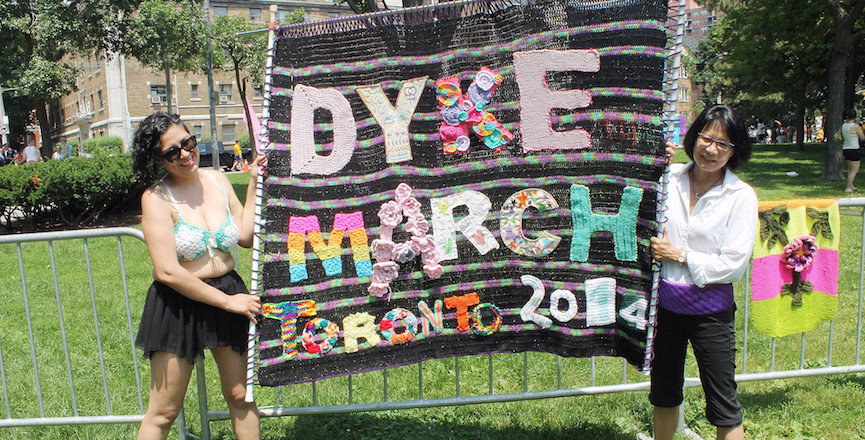The Dyke March has its origins in the fight for the right to exist from Pride proper, as a space cut out and defended by lesbians and their supporters as separate from the larger Pride parade — which, not in name but in practice, is considered the male expression of queerness.
The roots of the Dyke March is therefore unapologetically political. Since its first incarnation in 1996 by founders Lesha Van Der Bij and Lisa Hayes, the march is not without controversy as to its right to exist.
Looking back, it seems strange to consider that the Dyke march has only existed for two decades and was considered to be trial-blazing by some, as opposed to something that should have always existed. The fact that I see it so normalized is credit for its success.
At the time, organizers were warned that if less than one hundred people showed up, they would have to march on the sidewalk. Luckily, attendance was not the problem. The struggle for legitimacy seems to have been won, as well. But back then — nevermind the controversy concerning the exclusive nature of a march just for lesbians and their supporters — the very name got people up on their haunches.
Unfortunately, for Toronto Facebook users today, controversy and silencing are still being experienced — all in the name of keeping people safe from…themselves?
I don’t know how many Torontonian lesbians are on Facebook, nor how many Facebook users attended the Dyke march. But, unfortunately for them, instead of being able show their solidarity or support with pride, they are instead facing censorship.
Apparently, the word dyke is too controversial for Facebook administrators to trust consenting adults to use appropriately. So instead of giddy anticipatory posts ahead of the march, minute-by-minute status updates and after-march photo uploads, you could upload your content but not mention what event you were referring to. And if a Facebook user attempted to mention the Dyke March by name, the Facebook gods considered it a breach of its Community Standards.
Long time activist and rabbler, Elizabeth Pickett, brought this to my attention after she mentioned her censorship woes. When asked to elaborate, Pickett stated, “Apparently lesbians talking about ourselves breaches FB’s Community Standards. This is particularly noxious given how many women are subjected to the most overt, blatant and hateful harassment, threats, stalking and hatred on FB and are ignored when we complain about it.”
If you dared to use the word dyke simply in glee, or were using it after finding out that others were having trouble with censorship, it didn’t matter because as with any wide-brush censorship, it cannot take into account context. Here, no one was using dyke as a slur, and the term was in fact the front page headline in Canada’s largest daily newspaper over the weekend. Nevermind the fact that Pride Toronto itself uses the word dyke.
Here we have a new age, with a technology platform trying to prevent people from harming themselves in the same way adults should be able to run with scissors, even in a room full of other people running with scissors. We’re adults and we should be allowed to run in whatever room we like with whatever we like.
Pickett also noted the lack of context as a factor. “Zuckerberg is an ignorant dick. FB’s Community Standards have nothing to do with communities of lesbians or anyone else outside the norm defined by rich white men.”
Wanting to start from a clean slate after contacting Facebook myself and knowing that many others had pledged to contact Facebook, I posted a status that included the word dyke and did not go to Facebook jail, although Pickett mentioned that some of her friends’ accounts were still locked. To be honest, I didn’t expect Facebook to make any attempt to communicate with me regarding the issue, though I did post an inquiry into the censorship on different websites hoping it would catch some employee’s eye.
I did receive a message from someone (who did not confirm if they were an employee or just a helpful internet-citizen) who messaged me to let me know about Facebook’s Community Standards, which I later found out was just a cut-and-paste job from the site. So by censoring the word dyke, and suspending the accounts of people who used that word, Facebook was helping keep me safe when it, “remove[d] content, disable[d] accounts when…we believe there is a genuine risk of physical harm or direct threats to public safety.”
It also notes, “These policies will help you understand what type of sharing is allowed on Facebook, and what type of content may be reported to us and removed. Because of the diversity of our global community, please keep in mind that something that may be disagreeable or disturbing to you may not violate our Community Standards.”
In this case, the reverse is true and while I’m not sure where to find the closet on Facebook, the multi-million dollar corporation seems to feel its safer if the dykes stay in there for their own safety.
Image: Flickr/Olivia Chow
Like this article? rabble is reader-supported journalism. Chip in to keep stories like these coming.




